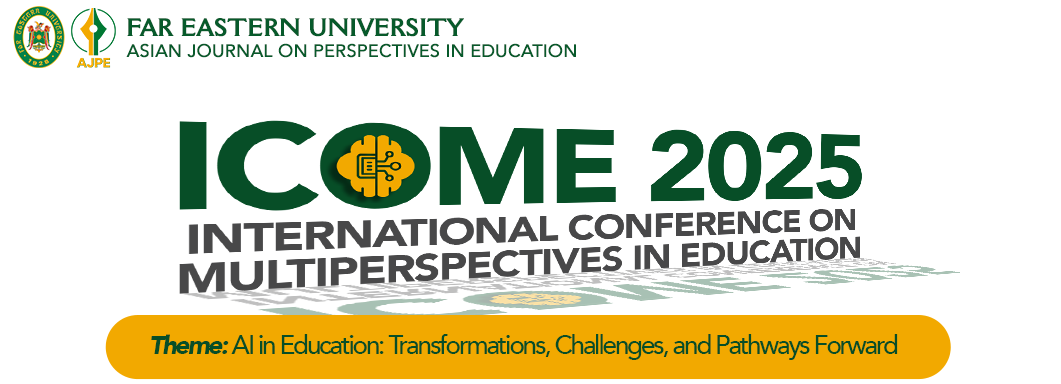
About ICOME 2025
ICOME 2025 — International Conference on Multiperspectives in Education is a fully online, FREE, and open-to-all conference hosted by Far Eastern University (FEU) through the Asian Journal on Perspectives in Education (AJPE).
Artificial Intelligence (AI) is reshaping how we teach, learn, assess, and lead. From personalized learning to academic integrity, from teacher workload to equity and access, the choices we make today will define the classrooms of tomorrow. Be part of the conversation and help chart the pathways forward.
ICOME 2025 convenes educators, researchers, leaders, and policymakers to explore how AI is reshaping teaching, learning, assessment, leadership, and equity. The program features plenary talks, a panel discussion, hands-on workshops, and parallel paper presentations, with free e-certificates for eligible presenters and participants.
CLICK ARROW TO EXPAND
Committees
Advisory Committee
Academic Affairs Office, Far Eastern University
Dr. Maria Teresa Trinidad P. Tinio, Far Eastern University, Philippines
Dr. Rosarito T. Suatengco, Far Eastern University, Philippines
Conference Co-Chairs
- Dr. Romualdo A. Mabuan, Far Eastern University, Philippines
- Dr. Rosarito T. Suatengco, Far Eastern University, Philippines
Technical Program Committee
- Mr. John Angelo V. De Leon, Far Eastern University, Philippines
- Dr. Hyunkyung Lee, Far Eastern University, Philippines
- Dr. Rommel L. Bunuan, Far Eastern University, Philippines
- Dr. Myrna P. Quinto, Far Eastern University, Philippines
- Dr. Aisa P. Arlos, Far Eastern University, Philippines
- Dr. Ma. Lourdes Nery-Cura, Far Eastern University, Philippines
- Dr. Stephen D. Krashen, University of Southern California, USA
- Dr. Gerardo L. Blanco, Boston College, USA
- Dr. Jasmine A. Jain, Taylor’s University, Malaysia
- Dr. Alka Mudgal, Amity University, India
- Dr. Banchong Mahaisavariya, Mahidol University, Thailand
- Dr. Vikneswaran Nair, University of the Bahamas, Bahamas
- Dr. Nachamma Sockalingam, Singapore University of Technology and Design, Singapore
- Dr. Lim Chong Hin, Taylor’s University, Malaysia
- Dr. Neesa Ameera Mohammed Salim, Universiti Teknologi Mara, Malaysia
- Dr. Thomas Kaufmann, University of Illinois Urbana-Champaign, USA
- Dr. Jeoffrey Calimag, Kyungsung University, South Korea
- Dr. Marchee T. Picardal, Cebu Normal University, Philippines
- Dr. Carlos P. Tatel, Jr., University of the Philippines, Philippines
- Dr. Shirley N. Dita, De La Salle University, Philippines
- Dr. Teresita T. Rungduin, Philippine Normal University, Philippines
- Dr. Rebecca C. Sagot, Department of Education, Philippines
Plenary Speakers
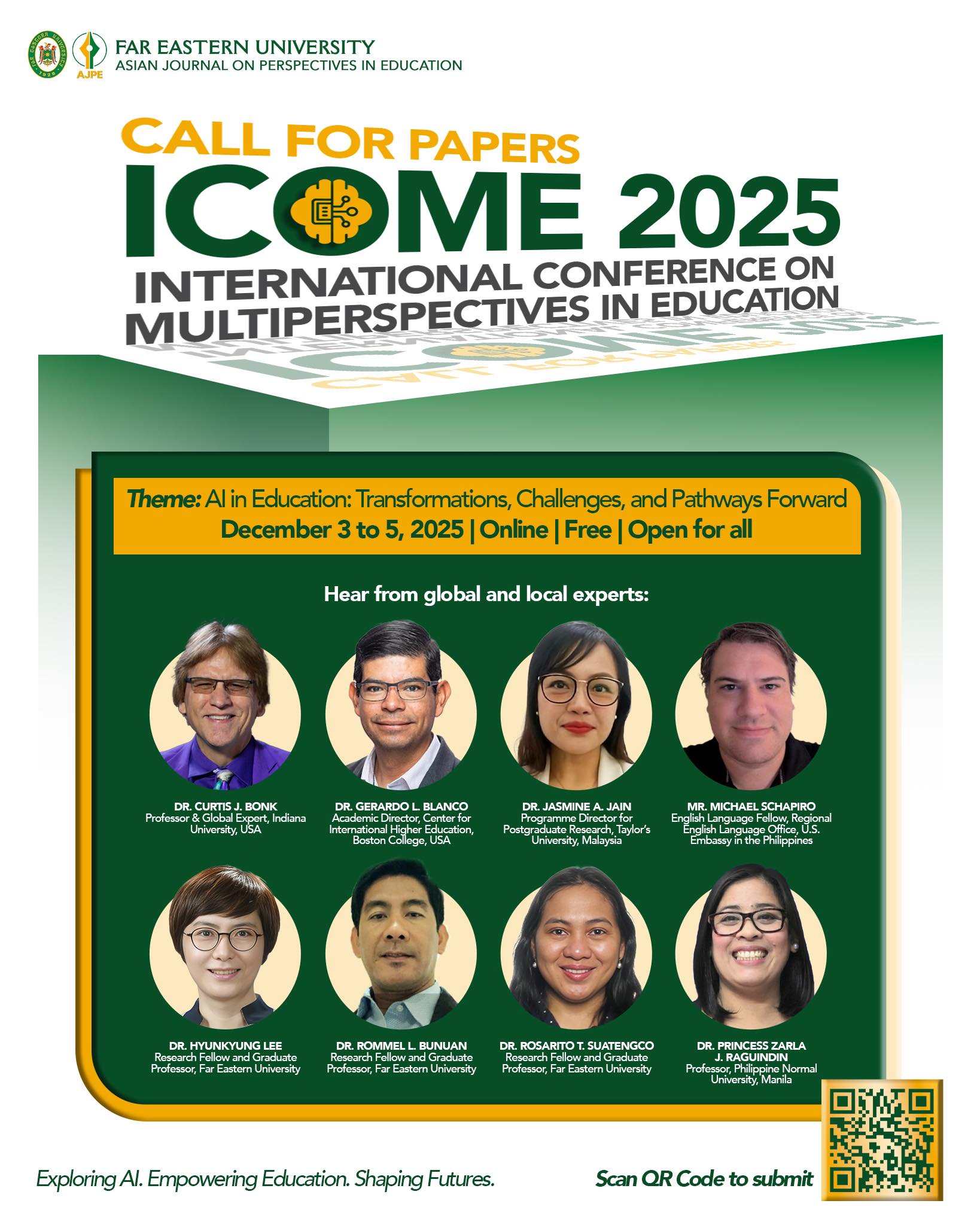
Plenary Talks
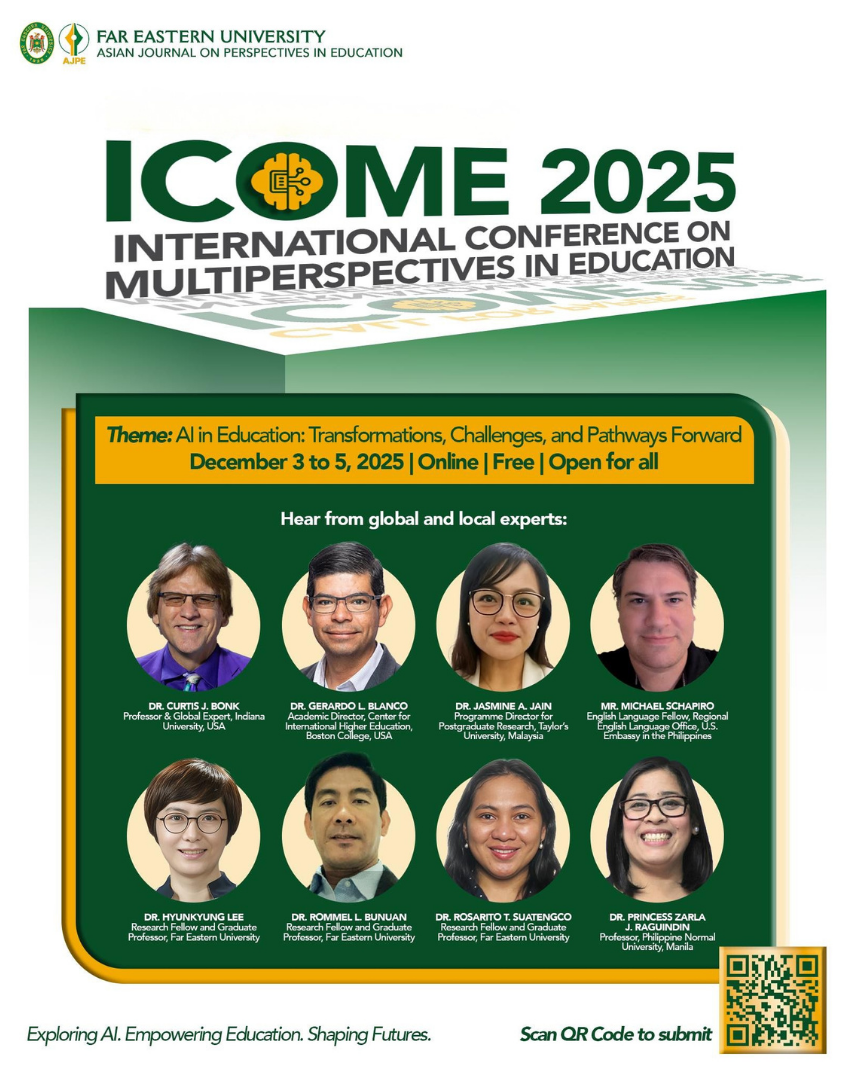
CURTIS J. BONK, PHD
Professor & Global Expert
Indiana University, IN, USA
Can You Believe It?: AI-Enhanced Self-Directed Lifelong Learning is Here!
Abstract
For a half century, educators, psychologists, and researchers have been predicting that highly intensive, innovative, and individualized learning formats powered by intelligent agents and tutors are only a few years away. However, each year would arrive with the same lovely hopes and dreams and unfortunately depart with little fanfare. Fast forward to today where the endless decades of promises seem much more relevant and realistic today with the advent of generative AI technology such as DeepSeek, ChatGPT, Gemini, Claude, Copilot, Perplexity, etc. Today, the learner, guided by generative AI, is seeking out learning experiences (e.g., engaging in different levels of simulated experiences, beginning to learn a new language, learning to write poetry or musical lyrics, etc.), instead of being forced down preset paths with predetermined outcomes. The learner is increasingly self-directed and the learning environment is learner-determined, lifelong, and individualized. What the human race needs to do is design guidelines, specific training experiences, and novel assessments for this self-directed lifelong learning world. It may be hard to believe, but AI-enhanced self-directed lifelong learning is here and with it so too are new opportunities for every learner on this planet.
Speaker’s Bio
Dr. Curtis J. Bonk is a Professor of Instructional Systems Technology at Indiana University’s School of Education, where he also serves as Coordinator of the Certificate in Online Teaching and Learning Practices. A pioneering scholar in online and blended learning, open education, and global educational innovation, he is a Fellow of the American Educational Research Association (AERA), the Association for Educational Communications and Technology (AECT), and the Online Learning Consortium (OLC). Dr. Bonk has authored over 400 publications and 17 books, including The World is Open and MOOCs and Open Education Around the World. He is co-host of the award-winning podcast Silver Lining for Learning and President of CourseShare LLC. Recognized among the world’s top two percent of scientists by Stanford University and Elsevier, his research focuses on technology-enhanced learning, self-directed and open education, and the global democratization of knowledge through innovative pedagogies and emerging technologies.
GERARDO L. BLANCO, EDD
Associate Professor and Academic Director, Center for International Higher Education
Boston College, MA, USA
QUALITATIVE RESEARCH IN THE AI ERA: NARRATIVES, PRACTICES, AND POSSIBILITIES
Abstract
This plenary talk explores how Artificial Intelligence (AI) is transforming the landscape of qualitative inquiry, reshaping how narratives are constructed, data are interpreted, and meanings are co-created. It examines the integration of AI tools in qualitative research design, data collection, coding, and analysis, while addressing ethical, epistemological, and methodological implications. Through real-world examples, the session highlights both the affordances and tensions of AI-assisted interpretation, advocating for critical, human-centered engagement with technology. Ultimately, it calls for reimagining qualitative research as a dynamic, reflexive practice where human insight and machine intelligence intersect to expand possibilities for understanding lived experience.
JASMINE A. JAIN, PHD
Programme Director for Postgraduate Research
Taylor’s University, Malaysia
ETHICS AND EQUITY IN AI-DRIVEN EDUCATION
Abstract
This plenary talk examines the ethical imperatives and equity challenges emerging from the rapid integration of Artificial Intelligence (AI) in education. It explores issues of bias, transparency, accountability, and data privacy, emphasizing how AI systems can both advance and threaten fairness in learning environments. Drawing from global research and policy frameworks, the session highlights the need for inclusive AI design that empowers rather than marginalizes learners. Ultimately, it calls for educators, policymakers, and technologists to collaborate in shaping ethical AI ecosystems that uphold human dignity, promote social justice, and foster equitable access to quality education for all.
Speaker’s Bio
Dr. Jasmine Anak Jain is a Senior Lecturer at Taylor’s University, Malaysia, specializing in science literacy, inclusive education, and technology-enhanced learning. She earned her PhD in Education (Science Education) from Universiti Teknologi MARA and is a Certified Assessor for the Malaysian Qualifications Agency (MQA) and a Google Certified Trainer. Dr. Jain has secured national and institutional research grants, published in high-impact (Q1) journals, and developed innovative educational tools such as the NOS.tudy Guide app. As Programme Director for Research Postgraduate Programmes, she oversees one of Taylor’s largest PhD cohorts. Her leadership extends internationally as Adjunct Professor at Far Eastern University (Philippines) and Visiting Professor at Zhengzhou Education College (China). Recognized for her curriculum innovation and engagement in STEM education, she was a finalist for the Anugerah Khas YB Menteri (AKRI) National Award for STEM Teachfest.
MR. MICHAEL SCHAPIRO, MAT
English Language Fellow, Regional English Language Office,
U.S. Embassy in the Philippines
ENGLISH TEACHING IN THE ERA OF ARTIFICIAL INTELLIGENCE
Abstract
This plenary session explores how Artificial Intelligence (AI) tools are transforming English language teaching and learning. Highlighting applications such as ChatGPT, MagicSchool, BriskTeaching, and Diffit, the talk demonstrates practical ways teachers can integrate AI into lesson planning, classroom instruction, and assessment. Participants will discover methods for differentiating text levels, preparing dynamic slides, creating podcasts, designing scaffolded comprehension questions, and generating professional communication and rubrics. The session also introduces the “Three Reads Strategy” to enhance reading instruction. By the end, educators will gain practical, classroom-ready approaches for using AI to personalize instruction and optimize student engagement and learning outcomes.
Speaker’s Bio
Michael Schapiro is an English Language Fellow with the Regional English Language Office (RELO) at the U.S. Embassy in the Philippines, where he designs and facilitates teacher training and communication programs across higher education institutions. He holds a Master of Arts in Teaching English to Speakers of Other Languages (TESOL) from the University of Maryland, Baltimore County, and dual Bachelor’s degrees in Spanish Language and Literature and General Communication from the University of Maryland, College Park. A Fulbright Scholar to Colombia (2019–2020), Michael has taught and trained educators in the United States, Latin America, and Southeast Asia, including at Mariano Marcos State University, Holy Name University, and the University of California, Berkeley. His work focuses on intercultural communication, educational technology, and learner-centered pedagogy, promoting global collaboration and inclusive English language teaching excellence.
HYUNKYUNG LEE, PHD
Research Fellow and Graduate Professor
Far Eastern University, Philippines
AI AND THE FUTURE OF LEARNING: PATHWAYS FOR INNOVATION AND INCLUSION
Abstract
This plenary talk examines how Artificial Intelligence (AI) is reshaping the future of learning through innovation, personalization, and inclusion. It explores emerging trends in AI-driven education including adaptive learning systems, intelligent tutoring, and data-informed teaching, while addressing ethical and equity considerations in technology adoption. Through global and local perspectives, the session highlights how AI can empower educators to design inclusive learning experiences that respond to diverse learner needs. Participants will gain insights into practical frameworks and policy directions for harnessing AI responsibly, ensuring that technological progress fosters innovation, equity, and lifelong learning opportunities for all learners in the digital era.
Speaker’s Bio
Dr. Hyunkyung Lee is a University Research Fellow at Far Eastern University, Philippines and an International Professor at the FEU Institute of Education Graduate Studies and Transnational Education. She holds a Ph.D. and Ed.M. in Educational Technology from Yonsei University, South Korea, where she also served as an Outstanding Teaching Faculty Awardee in 2020. A former Learning Fellow at The MASIE Center in New York and Visiting Scholar at Indiana University’s School of Education, Dr. Lee has published extensively in Scopus- and Web of Science-indexed journals. Her research focuses on competency-based learning environments, instructional innovation, and technology integration in higher education. With a distinguished record of teaching and research in Korea, the United States, and Southeast Asia, Dr. Lee continues to advance global discourse on digital pedagogy. Her forthcoming book explores Artificial Intelligence–driven adaptive instructional strategies for transformative and inclusive learning.
ROMMEL L. BUNUAN, PHD
Research Fellow and Graduate Professor
Far Eastern University, Philippines
DESIGNING QUANTITATIVE RESEARCH FOR AI-ENHANCED EDUCATION
Abstract
This lecture will provide a step-by-step workflow for designing and conducting a meta-analytic study that examines the impact of artificial intelligence (AI) on preservice teachers’ technology integration. It will guide both practitioners and researchers through the entire process, from formulating research questions to appropriate reporting. Key concepts will be discussed, including effect size calculation, model selection, moderator analysis, and publication bias. To make the session more hands-on, an exemplar study will be presented to illustrate each step of the entire process. The lecture is tailored to support researchers with a structured approach to conducting meta-analysis within their area of expertise.
Speaker’s Bio
Dr. Rommel L. Bunuan is a University Research Fellow at Far Eastern University and a Graduate Professor at the FEU Institute of Education Graduate Studies and Transnational Education. He earned his Ph.D. in Educational Psychology, specializing in Quantitative Research Methods, from the University of Texas at Austin. At FEU, he leads faculty research initiatives under the Academic Affairs Office and serves on the Publication Incentives Review Committee. His research interests include student motivation, educational assessment, and quantitative modeling in education. Dr. Bunuan has published in prestigious, Scopus Q1-indexed journals such as Review of Educational Research, The Journal of Experimental Education, International Journal of Social Research Methodology, and International Journal of Educational Research. Recognized for his expertise in psychometrics and advanced statistical analyses, he continues to mentor emerging researchers and promote data-driven innovation in education and learning sciences.
ROSARITO T. SUATENGCO, PHD
Research Fellow and Graduate Professor
Far Eastern University, Philippines
LOOKING AHEAD: SHAPING THE FUTURE OF EDUCATION IN THE AI ERA
Abstract
This closing plenary envisions the future of education in an age increasingly defined by Artificial Intelligence (AI). It reflects on how AI is transforming pedagogy, assessment, leadership, and lifelong learning, while underscoring the enduring value of human creativity, empathy, and ethical judgment. The talk highlights global innovations that illustrate how educators can harness AI to promote inclusion, collaboration, and critical inquiry. As participants conclude the conference, this session serves as both a synthesis and a call to action, inviting educators, researchers, and policymakers to lead with foresight, responsibility, and imagination in shaping education for the AI-empowered future.
Speaker’s Bio
Dr. Rosarito T. Suatengco is a University Research Fellow for Education at Far Eastern University, and the current and founding Editor-in-Chief of the Asian Journal on Perspectives in Education (AJPE). Formerly the Dean of Education and Associate Dean for Special Projects at FEU, she also serves as the founding president of HAMAKA Pilipinas, an organization advancing Philippine languages, culture, and indigenous knowledge. She holds a Ph.D. in Applied Linguistics from De La Salle University–Manila as a CHED-HEDP FDP scholar and an international certificate in Professional Development for Teacher Trainers from Arizona State University. Dr. Suatengco has led DOST- and FEU-funded research projects and serves as a lead convenor of international conferences on language, education, and research. Her scholarly work and leadership continue to champion inclusive, culturally responsive education and elevate Philippine scholarship in the global academic community.
PRINCESS ZARLA J. RAGUINDIN, PHD
Professor
Philippine Normal University, Philippines
DOING QUALITATIVE RESEARCH IN THE AGE OF AI: LEVERAGING MAXQDA AS YOUR ANALYTICAL PARTNER
Abstract
As artificial intelligence reshapes how we conduct research, qualitative researchers face new questions about maintaining analytical depth and interpretive authenticity in their work. This presentation demonstrates how MAXQDA supports rigorous qualitative analysis while preserving the thoughtful, contextual judgment that makes qualitative research meaningful.
Whether new to qualitative software or experienced researchers, this session walks participants through the complete analytical process—from organizing data to building coding systems that genuinely reflect what is being discovered. Participants will explore practical features like activation and retrieval for comparing themes across cases, memo writing for developing theoretical insights, segment weighting to focus on what matters most, and MAXDictio for analyzing patterns in language and discourse.
The key question addressed is this: how can researchers use powerful software tools without losing sight of what qualitative research does best—understanding complexity, context, and human meaning? MAXQDA works best as a partner in thinking, not a shortcut around it.
Participants will leave this session with practical skills and a clear understanding that good qualitative analysis is still fundamentally about interpretation, judgment, and reflexivity. The software helps researchers work more systematically and transparently, but the intellectual work of making sense of data remains theirs.
Speaker’s Bio
Dr. Princess Zarla J. Raguindin is an Associate Professor at the Philippine Normal University in Manila and a noted scholar in inclusive education, early childhood pedagogy, and curriculum development. With a doctoral qualification in educational research methods and inclusive education from Shaanxi Normal University (China) and the University of the Philippines Diliman, she has published widely in international Scopus- and Web of Science-indexed journals. Her recent work examines themes such as the “children-supporting-children” platform and children’s agency in inclusive classrooms. Dr. Raguindin uses phenomenological and grounded-theory approaches to explore how Filipino learners participate in inclusive educational culture. Her research has generated frameworks for engaging, affirming, and nurturing environments in Philippine schools. Beyond her research, she mentors emerging scholars, contributes to national-level teacher-education reform, and sits on review panels for international journals.
Panel Discussion
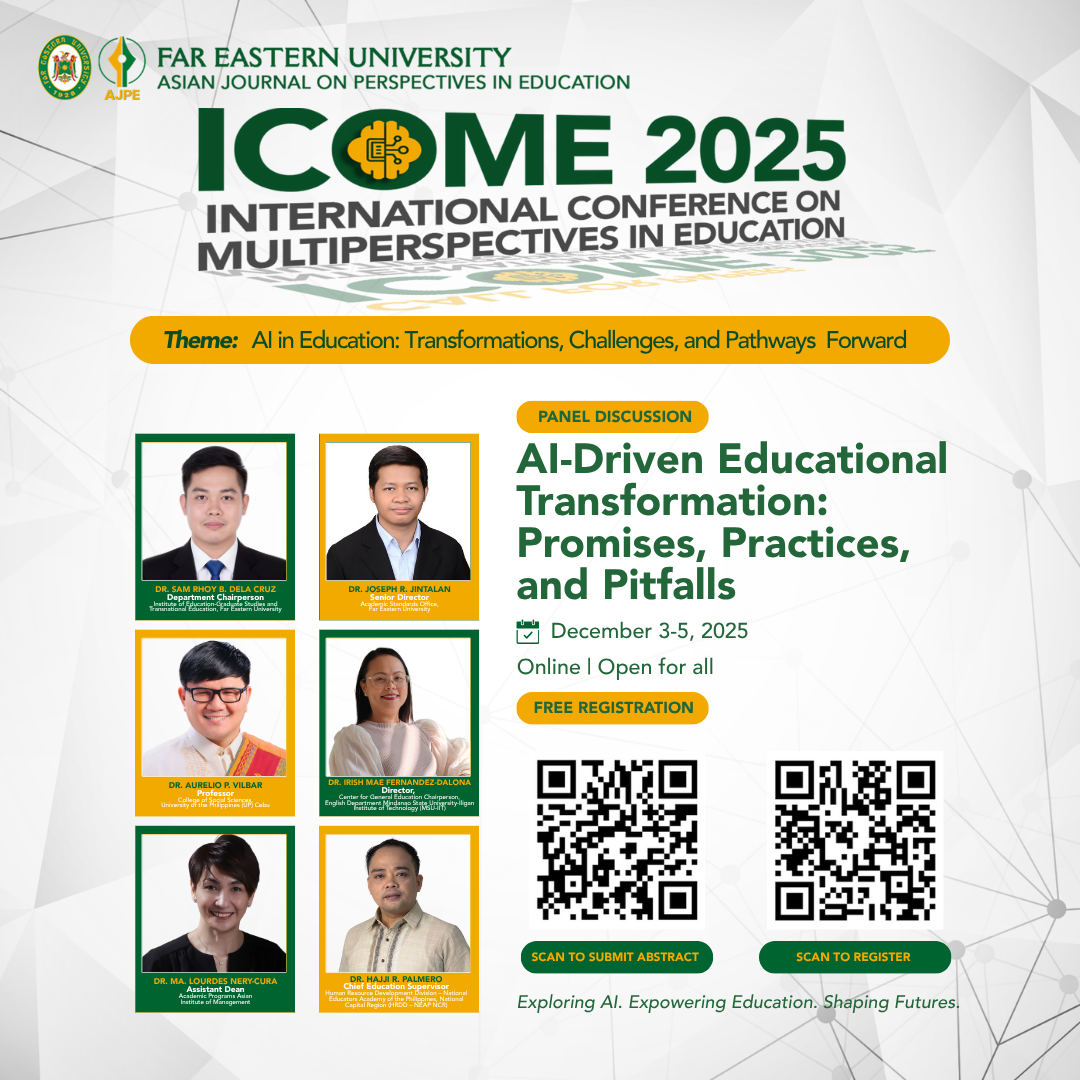
SAM RHOY B. DELA CRUZ, PHD
Department Chairperson, Institute of Education-Graduate Studies and Transnational Education
Far Eastern University, Philippines
Dr. Sam Rhoy B. Dela Cruz is the Department Chair of Graduate Studies and Transnational Education at the Far Eastern University Institute of Education, Manila. He is an Associate Member of the National Research Council of the Philippines (NRCP) and holds a Doctor of Philosophy in Education major in English Language Education from Bulacan State University. Currently, he is pursuing a Doctor of Philosophy in Education by Research at the Philippine Normal University, Manila. Dr. Dela Cruz has published several research works in Scopus and other international refereed journals, focusing on education, language studies, human and social sciences, and educational assessment. His research interests include qualitative research, realist evaluation, and language education.
JOSEPH R. JINTALAN, EDD
Senior Director, Academic Standards Office
Far Eastern University
Dr. Joseph R. Jintalan is the Senior Director for Academic Standards at Far Eastern University (FEU), Manila, where he leads initiatives on internal quality assurance, curriculum alignment, faculty training, and student-centered learning. He finished his Doctor of Education in Curriculum and Instruction at the University of Santo Tomas Graduate School, with research focusing on the integration of sustainability education and critical thinking in outcomes-based teaching and learning. His professional interests span curriculum evaluation, instructional leadership, and assessment of learning.
AURELIO P. VILBAR, PHD
Professor
University of the Philippines (UP) Cebu
Dr. Aurelio P. Vilbar is a Professor at the College of Social Sciences, University of the Philippines (UP) Cebu, where he previously served as Director of the Ugnayan ng Pahinungód—the university’s volunteerism program. He earned his Ph.D. in English Language Education from UP Diliman and pursued further studies on sustainability under UNESCO Asia-Pacific. His research in software development, computer-assisted language learning, service learning, and multilingualism has earned him the UP International Publication Awards and the TESOL Award (USA). A CHED-commissioned author and Department of Education resource person for curriculum development, Dr. Vilbar also serves as a board officer of Asia TEFL and the Philippine Association for Language Teaching. He was a Visiting Scholar on global multilingualism research at the University of Hamburg, Germany, and was recognized as the 2024 UP Cebu Most Outstanding Professor for his excellence in research, teaching, and service.
IRISH MAE FERNANDEZ-DALONA, PHD
Director, Center for General Education
Chairperson, English Department
Mindanao State University-Iligan Institute of Technology (MSU-IIT)
Dr. Irish Mae Fernandez-Dalonais the Director of the Center for General Education and Chairperson of the English Department at Mindanao State University–Iligan Institute of Technology (MSU-IIT). A Fulbright alumna of the Foreign Language Teaching Assistant (FLTA) Program at the University of Michigan, Ann Arbor, she pursued coursework in Writing and Cross-Cultural Communication while serving as a teaching assistant. Her research interests span Discourse Analysis, Cross-Cultural Pragmatics, Sociolinguistics, and Translanguaging. Dr. Dalona has been involved in interdisciplinary research initiatives funded by the UK Department for Environment, Food & Rural Affairs (DEFRA), the Deutsche Gesellschaft für Internationale Zusammenarbeit (GIZ), Erasmus+, and the German Academic Exchange Service (DAAD).
Her academic leadership and collaborative research underscore her commitment to advancing intercultural communication, language education, and multilingual pedagogy in Philippine and global contexts.
MA. LOURDES NERY-CURA, PHD
Assistant Dean for Academic Programs
Asian Institute of Management
Dr. Ma. Lourdes N. Cura serves as the Assistant Dean for Academic Programs at the Asian Institute of Management (AIM), where she strategically oversees the design, delivery, and governance of 17 degree programs spanning business, development, disaster management, data science, entrepreneurship, innovation, cybersecurity, financial technology, and business law. She holds a Doctor of Education in Curriculum and Instruction from the University of Santo Tomas and a Master of Arts in Educational Administration from the University of the Philippines. A progressive education leader, Dr. Cura is an external trainer for the Knowledge Channel’s Learning Effectively through Enhanced Pedagogies (LEEP) program and a sought-after resource speaker on curriculum development and assessment. Her scholarly work explores philosophical and innovative approaches to curriculum and instruction, including rhizomatic learning, professional learning communities, and quality assurance frameworks that promote excellence and adaptability in higher education.
HAJJI R. PALMERO, PHD
Chief Education Supervisor
Human Resource Development Division – National Educators Academy of the Philippines, National Capital Region (HRDD – NEAP NCR)
Dr. Hajji R. Palmero serves as the Chief Education Supervisor of the Human Resource Development Division – National Educators Academy of the Philippines, National Capital Region (HRDD-NEAP NCR) under the Department of Education, Philippines. With a pivotal role in shaping professional learning and development for educators in Metro Manila, Dr. Palmero oversees HRD policies, induction programs, performance management, and regional training operations. He has led the regional Gender and Development (GAD) Secretariat’s coordination and facilitated key strategic meetings to align programs with national education goals. Dr. Palmero’s leadership advances teacher capacity-building, learning systems infrastructure, and institutional excellence for the NCR education sector.
Tracks
Track A — Teaching, Learning & Assessment
AI and Pedagogy • AI in Assessment & Evaluation • Generative AI & Academic Integrity • Human–AI Collaboration & Instructional Design • Well-being & Student Support • AI in STEM/STEAM & Digital Literacies
Track B — Equity, Inclusion & Languages
Ethics and Equity in AI • Inclusive & Special Needs Education (UDL, assistive tech) • Cultural/Linguistic Perspectives • AI in Language & Literature Education
Track C — Data, Analytics & Infrastructure
Learning Analytics & Data-Informed Decision Making • EdTech Infrastructure, Interoperability & Cybersecurity • Open Education, OER & AI-Enhanced Resources
Track D — Leadership, Policy & Systems
AI in Educational Policy & Management • QA/Accreditation in the AI Era • Workforce, TVET & Lifelong Learning • Teacher Education & Professional Development
Track E — Futures & Sustainability
Sustainability and Future Education (AI for SDG 4; long-horizon transformation)
Abstract Submission
FREE to present • Free e-certificate for eligible presenters
We invite abstracts aligned with the conference theme and tracks.
- Certificates: E-certificates issued to presenters who complete required steps
- Submit here: http://bit.ly/473Cw4O
- Abstract file (upload): 250–300 words; must include title, authors, affiliations, and 3–5 keywords
- Full paper (optional): 4,000–6,000 words (APA 7). Selected papers may be considered for the ICOME 2025 Best Paper Award and potential invitation to a special AJPE issue (no APCs).
- Presentation format: Online oral paper
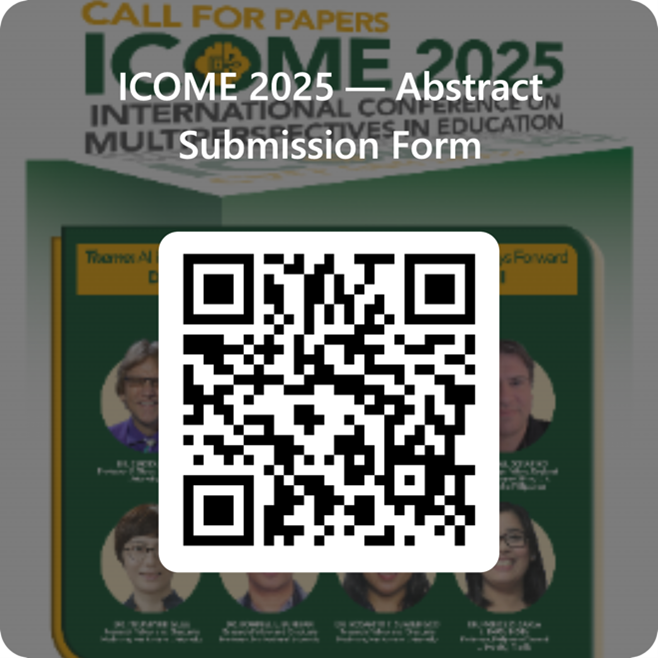
Key dates and reviewer guidance will be sent via email after submission.
Program
Day 1 — December 3 (Wed)
| Time | Session | Speakers |
| 1:00–1:05 PM | National Anthem & Prayer | — |
| 1:05–1:10 PM | Rationale | Dr. Romualdo A. Mabuan, Conference Director, Far Eastern University (Philippines) |
| 1:10–1:20 PM | Opening Remarks | Dr. Maria Teresa Trinidad P. Tinio, Senior Vice President for Academic Affairs, FEU (Philippines) |
| 1:30–3:00 PM | Opening Plenary — Reimagining Education in the AI Era | Dr. Curtis J. Bonk, Indiana University (USA) |
| 3:00–3:15 PM | Break | — |
| 3:15–4:00 PM | Panel — AI-Driven Educational Transformation: Promises, Practices, and Pitfalls | Dr. Sam Rhoy B. Dela Cruz (FEU); Dr. Ma. Lourdes Nery-Cura (Asian Institute of Management); Dr. Aurelio P. Vilbar (UP Cebu); Dr. Irish Mae F. Dalona (MSU–IIT); Dr. Hajji R. Palmero (NEAP–NCR) |
| 4:00–6:00 PM | Workshop 1 — Designing Quantitative Research for AI-Enhanced Education | Dr. Rommel L. Bunuan, Far Eastern University (Philippines) |
Day 2 — December 4 (Thu)
| Time | Session | Speakers |
| 9:00–10:00 AM | Plenary — Qualitative Research in the AI Era | Dr. Gerardo L. Blanco, Boston College (USA) |
| 10:00–11:00 AM | Parallel Papers — Session 1 | — |
| 11:00 AM–12:00 PM | Parallel Papers — Session 2 | — |
| 12:00–1:30 PM | Lunch Break | — |
| 1:30–2:30 PM | Parallel Papers — Session 3 | — |
| 2:45–3:45 PM | Plenary — AI and the Future of Learning | Dr. Hyunkyung Lee, Far Eastern University (Philippines) |
| 3:45–5:45 PM | Workshop 3 — Using MAXQDA for AI-Related Research & Data Analysis | Dr. Princess Zarla J. Raguindin, Philippine Normal University (Philippines) |
Day 3 — December 5 (Fri)
| Time | Session | Speakers |
| 9:00–10:00 AM | Plenary — Ethics and Equity in AI-Driven Education | Dr. Jasmine A. Jain, Taylor’s University (Malaysia) |
| 10:00–11:00 AM | Plenary — English Teaching in the Era of Artificial Intelligence | Mr. Michael Schapiro, Regional English Language Office, U.S. Embassy in the Philippines |
| 11:00–11:15 AM | ICOME 2025 Proceedings with AJPE | Mr. John Angelo V. De Leon, Far Eastern University (Philippines) |
| 11:15–11:45 AM | Closing Plenary — Shaping the Future of Education in the AI Era | Dr. Rosarito T. Suatengco, Far Eastern University (Philippines) |
| 11:50 AM–12:00 PM | Closing Spiels | — |
Times in Philippine Time (UTC+08:00). Program may be updated.
Registration
FREE to attend • Free e-certificate for eligible participants
Register here: http://bit.ly/3VSVHsU
- E-certificates will be issued to participants who attend live and complete the evaluation form.
- Conference links and updates will be sent via email.
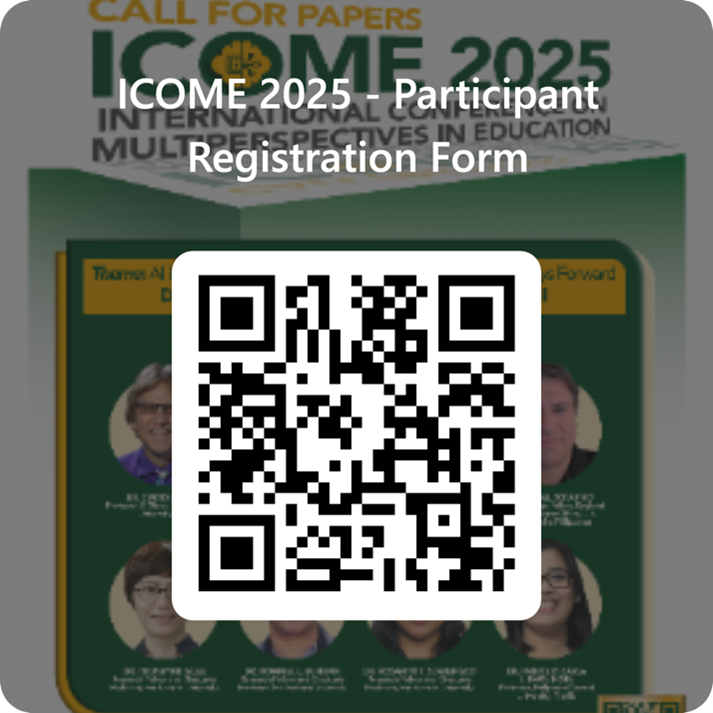
Venue
Online via Microsoft Teams
Links will be shared with registered participants via email.
Contact
For inquiries, please email the ICOME Secretariat at ajpe@feu.edu.ph
Organized by:
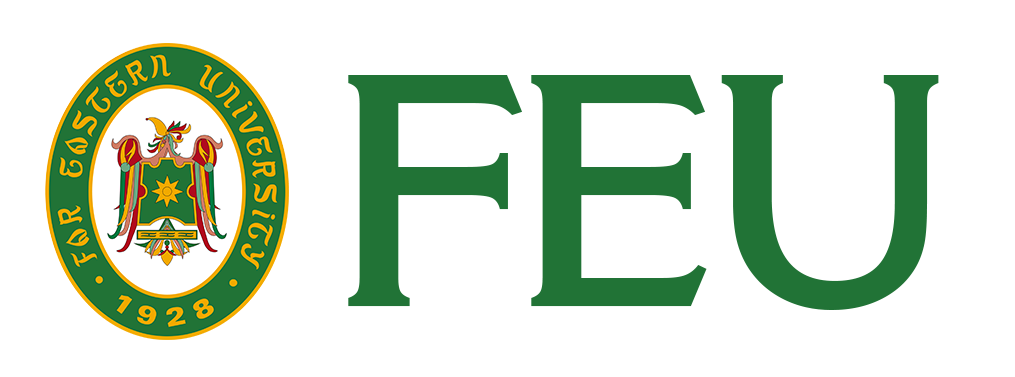
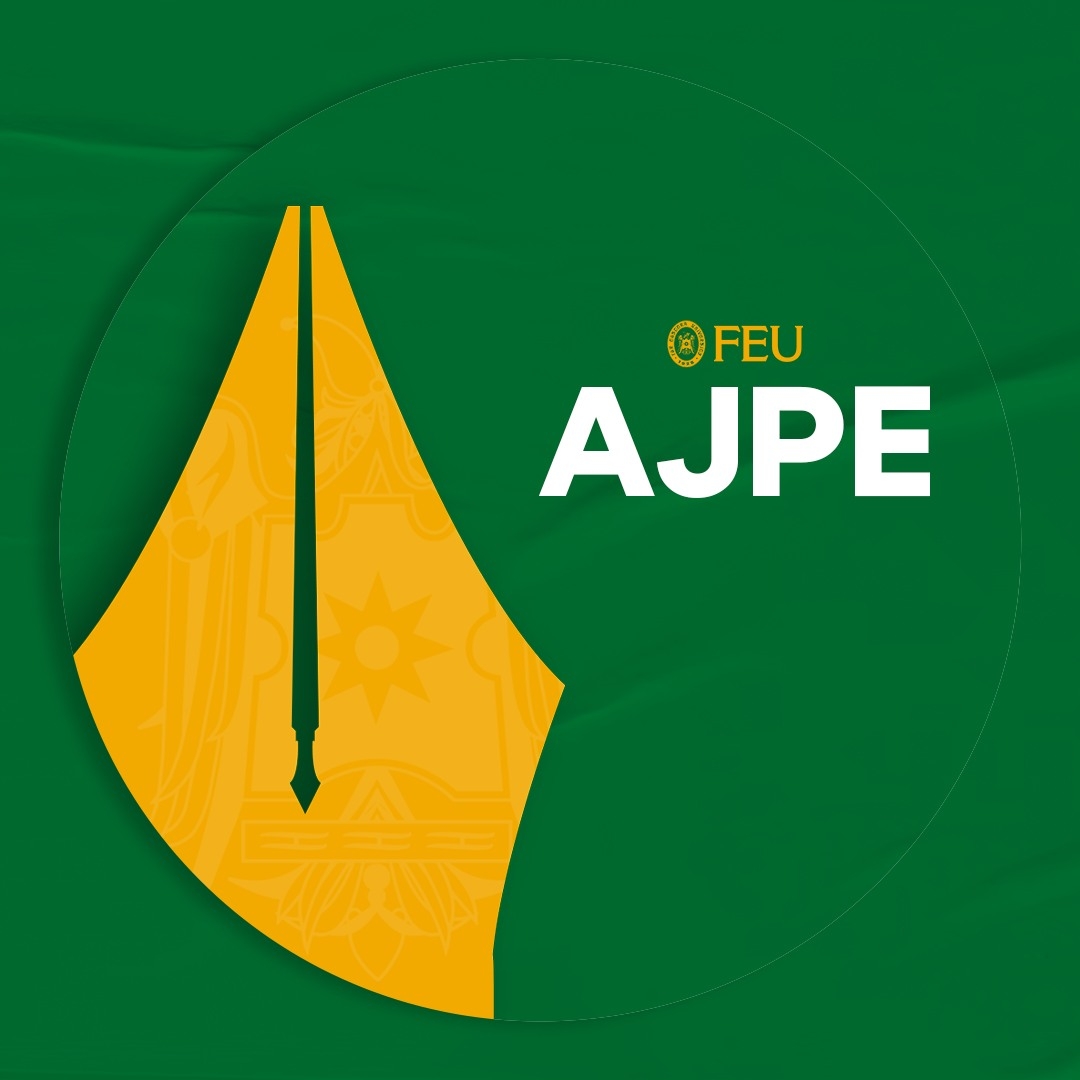
Exploring AI. Empowering Education. Shaping Futures.